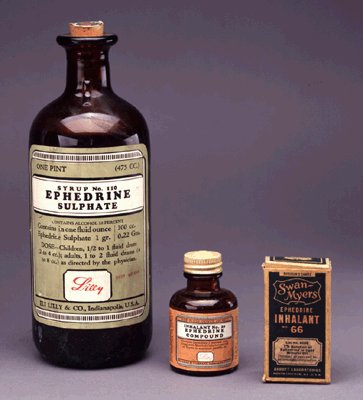
Ephedra (medicine)
Ephedra is a medicinal preparation from the plant Ephedra sinica.[1] Several additional species belonging to the genus Ephedra have traditionally been used for a variety of medicinal purposes, and are a possible candidate for the soma plant of Indo-Iranian religion.[2] It has been used in traditional Chinese medicine, in which it is referred to as Ma Huang, for more than 2,000 years.[3][4] Native Americans and Mormon pioneers drank a tea brewed from other Ephedra species, called "Mormon tea" and "Indian tea".
This article is about the use of the plant species containing ephedrine in supplements in the United States. For botanical information, see Ephedra (plant). For the chemical ephedrine, see ephedrine.Dietary supplements containing ephedra alkaloids have been found to be unsafe, with reports of serious side effects and ephedra-related deaths.[5][6][7][8] In response to accumulating evidence of adverse effects and deaths related to ephedra, the U.S. Food and Drug Administration (FDA) banned the sale of supplements containing ephedrine alkaloids in 2004.[9] The ban was challenged in court by ephedra manufacturers, but ultimately upheld in 2006 by the U.S. Court of Appeals for the Tenth Circuit.[10] Ephedra extracts not containing ephedrine have not been banned by the FDA and are still sold legally.[11]
Biochemistry and effects[edit]
A wide variety of alkaloid and non-alkaloid compounds have been identified in various species of ephedra. Of the six ephedrine-type ingredients found in ephedra (at concentrations of 0.02-3.4%), the most common are ephedrine and pseudoephedrine,[12] which are the sources of its stimulant and thermogenic effects.[3] These compounds stimulate the brain, increase heart rate, constrict blood vessels (increasing blood pressure), and expand bronchial tubes (making breathing easier). Their thermogenic properties cause an increase in metabolism, as evidenced by an increase in body heat.
Ephedra is widely used by athletes as a performance-enhancing drug,[13] despite a lack of evidence that it improves athletic performance.[14][15] Ephedra may also be used as a precursor in the illicit manufacture of methamphetamine.[16]
Ephedra has been used as a weight-loss aid, sometimes in combination with aspirin and caffeine. Some studies in regulated and supervised environments have shown that ephedra is effective for marginal short-term weight loss (0.9 kg/month more than the placebo), although it was untested whether such weight loss is maintained.[17] However, several reports have documented a number of adverse events attributable to unregulated ephedra supplements.[18]
Adverse effects of ephedra consumption may include severe skin reactions, irritability, nervousness, dizziness, trembling, headache, insomnia, profuse perspiration, dehydration, itchy scalp and skin, vomiting, and hyperthermia. More serious potential side effects include irregular heartbeat, seizures, heart attack, stroke, and death.[19]
Purity and dosage[edit]
There are no formal requirements for standardization or quality control of dietary supplements in the United States, and the dosage of effective ingredients in supplements may vary widely from brand to brand or batch to batch.[20][21][22] Studies of ephedra supplements have found significant discrepancies between the labeled dose and the actual amount of ephedra in the product. Significant variation in ephedrine alkaloid levels, by as much as 10-fold, was seen even from lot to lot within the same brand.[23][24]